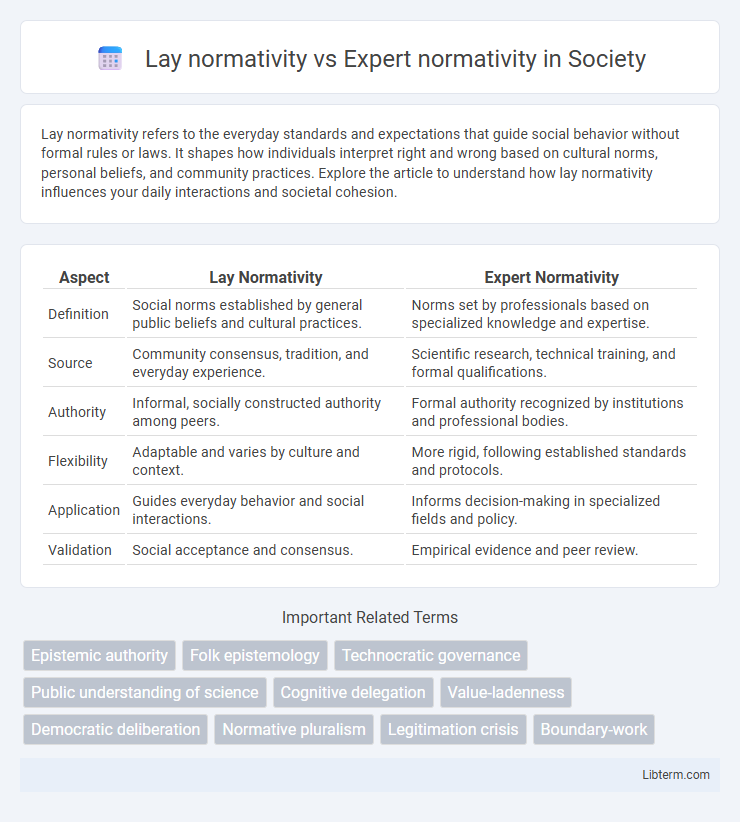Lay normativity refers to the everyday standards and expectations that guide social behavior without formal rules or laws. It shapes how individuals interpret right and wrong based on cultural norms, personal beliefs, and community practices. Explore the article to understand how lay normativity influences your daily interactions and societal cohesion.
Table of Comparison
| Aspect | Lay Normativity | Expert Normativity |
|---|---|---|
| Definition | Social norms established by general public beliefs and cultural practices. | Norms set by professionals based on specialized knowledge and expertise. |
| Source | Community consensus, tradition, and everyday experience. | Scientific research, technical training, and formal qualifications. |
| Authority | Informal, socially constructed authority among peers. | Formal authority recognized by institutions and professional bodies. |
| Flexibility | Adaptable and varies by culture and context. | More rigid, following established standards and protocols. |
| Application | Guides everyday behavior and social interactions. | Informs decision-making in specialized fields and policy. |
| Validation | Social acceptance and consensus. | Empirical evidence and peer review. |
Introduction to Lay Normativity and Expert Normativity
Lay normativity refers to the everyday moral judgments and social norms held by non-specialists, reflecting community values and common-sense perspectives. Expert normativity involves specialized ethical standards and principles developed by professionals within fields such as law, medicine, or philosophy, emphasizing technical knowledge and systematic frameworks. Understanding the distinction between lay and expert normativity is crucial for analyzing conflicts in ethical decision-making and policy formulation.
Defining Lay Perspectives on Normativity
Lay normativity refers to the everyday moral standards and social norms upheld by non-experts within a community, reflecting collective values and lived experiences. Expert normativity, in contrast, is grounded in specialized knowledge, formal ethical codes, or institutional guidelines established by professionals or authorities. Defining lay perspectives on normativity involves understanding how ordinary individuals interpret, negotiate, and apply normative principles based on cultural context, practical reasoning, and shared social practices.
Expert Normativity: Authority and Methodology
Expert normativity emphasizes the authority of specialized knowledge and the rigorous methodologies that underpin valid judgments within professional fields. This form of normativity relies on systematic evidence, peer review, and standardized procedures to establish credible standards and guide decision-making. The perceived legitimacy of expert norms derives from their foundation in expertise, objective analysis, and the consistent application of domain-specific principles.
Historical Evolution of Normativity Debates
The historical evolution of normativity debates reveals a shift from dominantly expert normativity, where professional authorities dictated norms, toward increasing recognition of lay normativity emphasizing everyday individuals' role in shaping social rules. Early philosophical discussions, such as those by Kant and Hume, predominantly reflected expert-driven frameworks, while 20th-century pragmatism and democratic theory introduced participatory perspectives highlighting the legitimacy of lay contributions. Contemporary normativity debates integrate both approaches, acknowledging the dynamic interplay between expert knowledge and lay experiences in establishing, interpreting, and contesting norms.
Epistemic Foundations: How Knowledge Shapes Norms
Lay normativity relies on everyday experiences and communal understandings to shape moral standards, emphasizing practical wisdom embedded in social contexts. Expert normativity is grounded in specialized knowledge and systematic inquiry, drawing on epistemic rigor to establish norms within professional or academic domains. The epistemic foundations of these normativities highlight the tension between intuitive, context-based knowledge and formalized, evidence-based expertise in the construction of social norms.
Common Conflicts Between Lay and Expert Norms
Conflicts between lay normativity and expert normativity often arise from differing understandings of knowledge legitimacy and decision-making authority. Lay norms prioritize lived experience and community values, while expert norms emphasize technical expertise and empirical evidence, causing disputes in public policy and healthcare decisions. Misalignment between these perspectives can lead to mistrust, resistance to expert recommendations, and challenges in achieving consensus on social norms.
Case Studies: Lay vs Expert Norms in Public Policy
Case studies reveal significant tensions between lay normativity, grounded in community values and lived experiences, and expert normativity, based on scientific knowledge and technical expertise, in public policy formulation. Instances such as climate change adaptation strategies and urban planning highlight how lay perspectives often emphasize local knowledge and social justice, while expert norms prioritize empirical data and efficiency. Balancing these competing normativities is crucial for developing inclusive policies that are both socially acceptable and technically sound.
Communication Barriers in Normative Debates
Lay normativity often faces communication barriers in normative debates due to differing conceptual frameworks and specialized jargon used by experts, hindering mutual understanding. Expert normativity relies on technical language and established theories that may alienate laypersons, creating gaps in interpretive communities during discourse. Bridging these barriers requires translating expert terms into accessible concepts and validating lay perspectives to foster inclusive and effective normative discussions.
Strategies for Bridging the Lay-Expert Normativity Gap
Strategies for bridging the lay-expert normativity gap include fostering collaborative communication platforms that encourage mutual respect and understanding, enabling experts to convey complex knowledge in accessible language while valuing lay perspectives. Implementing participatory decision-making processes and co-creation workshops helps integrate experiential knowledge with scientific expertise, promoting shared norms and values. Leveraging digital tools and knowledge translation frameworks can further democratize information flow, reducing epistemic hierarchies and enhancing normative alignment between laypersons and professionals.
Future Implications for Society and Decision-Making
Lay normativity emphasizes the values and perspectives of everyday individuals, shaping societal norms through collective lived experiences, while expert normativity relies on specialized knowledge and technical expertise to inform decisions. Future implications for society involve balancing these approaches to enhance democratic participation and ensure decisions reflect both empirical evidence and community values. Integrating lay and expert normativity can improve decision-making by fostering inclusivity, legitimacy, and adaptability in addressing complex social challenges.
Lay normativity Infographic

 libterm.com
libterm.com